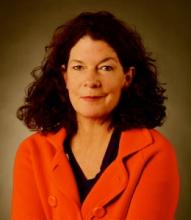We are so excited to be welcoming Bridget Connors into our School of Drama community. Read the interview below to learn more about Professor Connors and her unique take on the education of voice and dialects!
BR: Hi Bridget! Can you tell me a little bit about how you came to the UW?
BC: Before coming to the University of Washington I was in Pittsburgh, Pennsylvania, where I taught at Point Park University for ten years. As Head of the Voice and Movement Program I taught voice, speech, dialects, language and acting. I have always admired the program here at the University of Washington and it’s outstanding reputation. When I became aware that my friend Judy Shahn was going to retire, leaving an opening at the UW School of Drama, I believed the position as voice teacher would be a good match for my personal and professional life and my teaching career. I was ready for a new chapter in my life, helping me to grow both as a teacher and as an actor. I was excited by the prospect of teaching graduate students again in an exceptional program, supported by a talented and inspiring faculty within the backdrop of a research-one institution. I am thrilled to be here.
In any text that I am working on, whether it is classical, contemporary, or a song, I always return to the central connection of thought, breath, feeling, sound, impulse, language, and the world of the play.
BR: What got you interested in focusing on the vocal element of theatre?
BC: I grew up around sound, music and language. My mother Irene was a voice teacher and actress. From a young age I was exposed to the transformative power of voice and its relationship to acting and the world we live in. Not surprisingly I pursed vocal training, vocal performance and singing at the University of Michigan School of Music, followed by earning my MFA in Acting at the California Institute of the Arts. I continued to deepen my understanding of the connection between voice, body, language and the acting process as the way in to character development and dramatic realization of the play. It just made sense to me. It was a natural progression for me to continue to study and train as a voice and language teacher, specifically in the Linklater Voice Technique, which I pursued post-grad training. I worked with Kristin Linklater and several other master teachers over a series of years, cumulating in my designation as a Linklater voice teacher. I continued to develop teaching exercises that focus on the connection of the spoken word to the emotional landscape of the character - the physical, intellectual, spiritual relationship to the character and the language in the world of the play. This is what really interests me. In any text that I am working on whether it is classical, contemporary, or a song, I always return to the central connection of thought, breath, feeling, sound, impulse, language, and the world of the play.
BR: What do you mean when you say teaching language?
BC: I feel that every voice or speech class is fundamentally a language class, with sound having meaning beyond language with natural vitality, energy, and connectedness. I am interested in working with students to figure out what language uniquely means to them as human beings, as expression of self identity and awareness, and as characters revealing the inner life of the play. The relationship and discovery is different for everyone. Certainly the connection of the voice to the spoken word reflects our cultural, historical, societal, political, ancestral, and environmental compass. It is our privilege as actors to decode the story and our visceral relationship with sound and meaning through the unraveling of language.
BR: Did you have a period in your career where you were acting, before you started teaching?
BC: I have been fortunate to continue to have an active professional acting career alongside my teaching. One of the things that drew me to UW was the distinguished faculty who are completely immersed and engaged in their professional careers. While my artistic life may differ from my students, I also am in the trenches with them whether it is in rehearsal or performing at night after a day of classes, or continuing to train with my teachers and mentors. I understand the trials and tribulations of our chosen path as we grow as artists, actors, and hopefully most importantly as human beings.
Certainly the connection of the voice to the spoken word reflects our cultural, historical, societal, political, ancestral, and environmental compass.
BR: What types of plays or roles do you love the most?
BC: As a reflection of my background, my training, and my love of sound, the classics resonate with me the most. The heightened language of Shakespeare and the Greek Plays demands from us a greater vocal and physical expressiveness. Through my acting career I have been fortunate to play many of Shakespeare’s heroines, as well as roles in the plays of Ibsen, Lorca, Yeats, Shaw, Chekhov, O'neill, Synge, and Thornton Wilder.
BR: How are you liking Seattle so far?
BC: I love Seattle so far! I was initially very worried about the weather, but so far it’s been great, so no complaints there! [Editor’s note - this interview was done a few weeks ago!] It’s beautiful, it’s expansive, the trees are enormous, the air is fresh. It’s a vibrant, cultural, engaging city, and the people are open and accessible. I’ve spent a lot of time on the West Coast, so I feel like I’m coming home.
BR: What are you most excited for your first year at UW?
BC: I am most excited to get to know the students, the wonderful collaborative faculty and staff, and the university at large. I can’t wait for the journey to unfold

